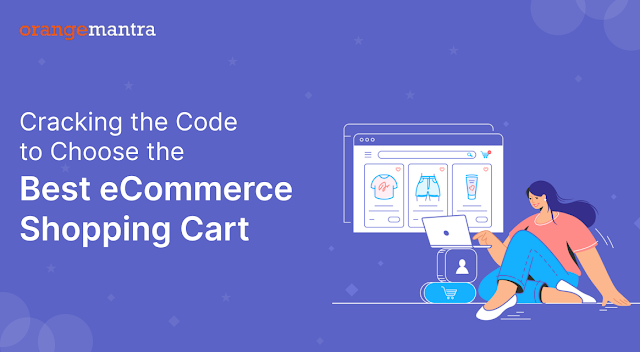Cracking the Code to Choose the Best Ecommerce Shopping Cart
Choosing an ideal shopping cart is a daunting task in the market where an array of options are available. But, selecting the one according to your requirements is crucial in the ever-evolving world of online business. Ecommerce shopping cart works as a backbone of your virtual storefront, managing overall inventory, simplifying the shopping experience, and facilitating seamless transactions.
The right shopping cart makes all the difference, whether you’re a small business owner wanting to establish an online presence or an established enterprise seeking to expand your operations. Understanding your business needs will help you narrow down the shopping cart solutions that align with your goals.
Before diving into the vast array of shopping cart options, it's vital to identify your specific business requirements. You can consider the following questions:
- What type of products are you selling?
- Do you require a built-in inventory management system?
- Will you need support for multiple languages or currencies?
There are some key factors that you should consider while choosing the perfect shopping cart from popular platforms. Each platform has its own set of features, advantages, and capabilities, which can help you make informed decisions. Let’s dig deep into the features of each platform and the factors that set them apart. By evaluating your business needs, consider factors such as scalability, customization, user-friendliness, payment gateway, and app ecosystem.
A Comparative Analysis of Ecommerce Shopping Cart Platforms
lMagento
Starting with Magento, the versatile powerhouse platform, known for its flexibility and scalability. It can be a robust choice for businesses with complex requirements. The platform offers extensive customization features allowing developers to create a unique Magento eCommerce store tailored to your brand identity.
Additionally, it has a wide range of extensions that enable developers to enhance store functionality. It can handle large product catalogs, high traffic volumes, and complex business processes making it an ideal choice for established enterprises or growing businesses.
lWooCommerce
Referred as WordPress integration, the platform integrates with the most common content management system, WordPress, if you’re already using it. WooCommerce offers a user-friendly interface, and customization options, giving developers the leverage to transform the WordPress website into a fully functional online store.
Its user interface is familiar with WordPress, making it easy for beginners to set up and manage an online store. You can choose from a vast selection of themes, plugins, and extensions that enhances the store’s functionality and design. It seamlessly integrates with popular payment gateways and is suitable for both small and large enterprises.
lShopify
Shopify, all in one solution ecommerce solution has gained immense popularity for its simplicity and ease. It offers extensively designed themes, and a selection of plugins and extensions to enhance store functionality, eliminating the need for technical expertise. It's user-friendly interface and intuitive drag-and-drop store builder make Shopify custom theme development easier.
Moreover, the platform takes care of hosting, security, and payment gateway integration, so you can focus on growing your business. Its built-in gateway feature eliminates the need for third-party integrations. In addition to this, the multi-payment method gives a convenient shopping experience to customers. Shopify’s scalability, and comprehensive features make it a reliable choice for enterprises and small business owners.
lPrestaShop
PrestaShop, recognized as an open-source e-commerce platform, gives a high degree of flexibility, customization options, and an active community. It has a range of visually appealing themes and templates, that allow developers to create captivating storefronts, reflecting your brand identity. You can control your store’s design, features, and functionality with the PrestaShop platform.
PrestaShop shopping cart development becomes easier with robust project management features, multi-store capabilities, and multi-language support and currencies, making it suitable for businesses targeting a global market. The platform gives freedom and flexibility to tailor an online store with a vibrant community, and extensive marketplace for modules and add-ons.
In conclusion, deciding on one E-commerce shopping cart requires consideration of factors such as business needs, platform, payment gateway, scalability, and analytic capabilities. Magento offers versatility and scalability for complex businesses. WooCommerce seamlessly integrates with WordPress. Shopify provides an all-in-one solution with a user-friendly interface. And, PrestaShop offers customization options and multi-store management.
By evaluating these platforms based on their unique features and capabilities, you can confidently select the shopping cart that aligns with your business goals. Also, choose an eCommerce Website Development Company in Gurgaon that sets you up for success. To sum up, the right shopping cart is the foundation upon which your online business thrives.



ecommerce web design services
ReplyDelete